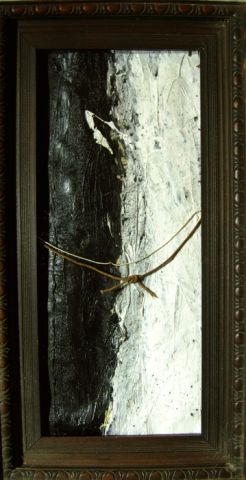I’ve learned something. And in re-reading the comments on my last few postings, I realize our discussion has impacted my actions directly.
Thank you everyone for your wishes of good luck!
I had an opening on Wednesday, the 25th of August, for my solo exhibition Vif! I have come away from the experience a little more able to articulate what I feel to be the responsibilities of the artist, which we were discussing recently. I faced an audience of conservative, rural but wealthy individuals who basically had very little, if no interest in abstract art. I had to find a way to present my work to them so that they could begin to engage. I felt responsible to do justice to my work and to find a way to reach out to the audience to help them understand. I also felt responsible to the gallery owners to do my best to educate this audience because it was the first show of abstract art they had presented.
I feel very strongly that an artist is responsible for more than just ‘being responsible to the work and all else follows’ as David Minton has suggested. I want to say clearly, that I do agree with this statement and I believe it to be very important, but I feel there is more….
Responsibilities of the Artist:
To do homework –
Whether this is the development of technical skills, ideas and concepts, knowledge base, business skills, verbalization of ideas etc. we must be responsible to all aspects in the continued development of ourselves.
To understand the importance of key relationships –
dealers, collectors, press, supporters, curators, colleagues
These relationships (in no particular order) and perhaps others, should be developed and maintained with respect, openness and integrity. They are important to us and we are important to them.
To consider your audience –
As artists we should be thoughtful of those who view our work. We must respect the audience at whatever level they are at in terms of understanding art and do all we can to help them engage with our work. It is always important education when we spark new ways of seeing the world.
To always strive to broaden horizons –
We all can so easily become set in our ways and views. It is essential to have intellectual stimulation and challenge. Artists are particularly good at providing that stimulation and challenge (one of the reasons why art is important).
To realize our relationship to society –
We are in context. We must understand that relationship, how we fit in to it, and why we are an important part of it, even if we feel sometimes that we are not connected and are in no way important, and also, to realize how important the relationship to society is to our survival.
To give as much or more than we take –
The effort we take to address and fulfill each of these responsibilities will return more than we can imagine at the end of it all. Believe in that.
To the work –
Work with integrity – always.
Viewers sense when work is flippant, false or not integral. I truly believe an audience can accept if we can’t answer why we did something or what it may mean to us, but they will not accept being lied to.
To yourself –
Believe in what you are doing, who you are and that your experience is important in the larger scheme of things. We’ve chosen to be artists because we want to communicate something. Finding out what that is and finding a way to say it may be the most important thing we do.
Tell me what you think we are responsible for as artists, I’d love to hear what you think.








